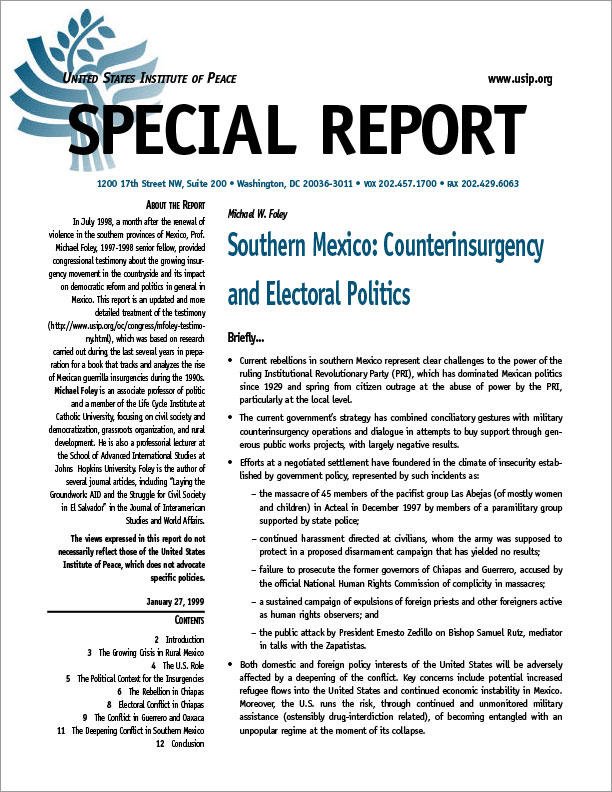
Summary...
- Current rebellions in southern Mexico represent clear challenges to the power of the ruling Institutional Revolutionary Party (PRI), which has dominated Mexican politics since 1929 and spring from citizen outrage at the abuse of power by the PRI, particularly at the local level.
- The current government's strategy has combined conciliatory gestures with military counterinsurgency operations and dialogue in attempts to buy support through generous public works projects, with largely negative results.
- Efforts at a negotiated settlement have foundered in the climate of insecurity established by government policy, represented by such incidents as:
- the massacre of 45 members of the pacifist group Las Abejas (of mostly women and children) in Acteal in December 1997 by members of a paramilitary group supported by state police;
- continued harassment directed at civilians, whom the army was supposed to protect in a proposed disarmament campaign that has yielded no results;
- failure to prosecute the former governors of Chiapas and Guerrero, accused by the official National Human Rights Commission of complicity in massacres;
- a sustained campaign of expulsions of foreign priests and other foreigners active as human rights observers; and
- the public attack by President Ernesto Zedillo on Bishop Samuel Ruíz, mediator in talks with the Zapatistas.
- Both domestic and foreign policy interests of the United States will be adversely affected by a deepening of the conflict. Key concerns include potential increased refugee flows into the United States and continued economic instability in Mexico. Moreover, the U.S. runs the risk, through continued and unmonitored military
assistance (ostensibly drug-interdiction related), of becoming entangled with an unpopular regime at the moment of its collapse.
About the Report
In July 1998, a month after the renewal of violence in the southern provinces of Mexico, Prof. Michael Foley, 1997-1998 senior fellow, provided congressional testimony about the growing insurgency movement in the countryside and its impact on democratic reform and politics in general in Mexico. This report is an updated and more detailed treatment of the testimony (/oc/congress/mfoley-testimony.html), which was based on research carried out during the last several years in preparation for a book that tracks and analyzes the rise of Mexican guerrilla insurgencies during the 1990s. Michael Foley is an associate professor of politic and a member of the Life Cycle Institute at Catholic University, focusing on civil society and democratization, grassroots organization, and rural development. He is also a professorial lecturer at the School of Advanced International Studies at Johns Hopkins University. Foley is the author of several journal articles, including "Laying the Groundwork: AID and the Struggle for Civil Society in El Salvador" in the Journal of Interamerican Studies and World Affairs.
The views expressed in this report do not necessarily reflect those of the United States Institute of Peace, which does not advocate specific policies.